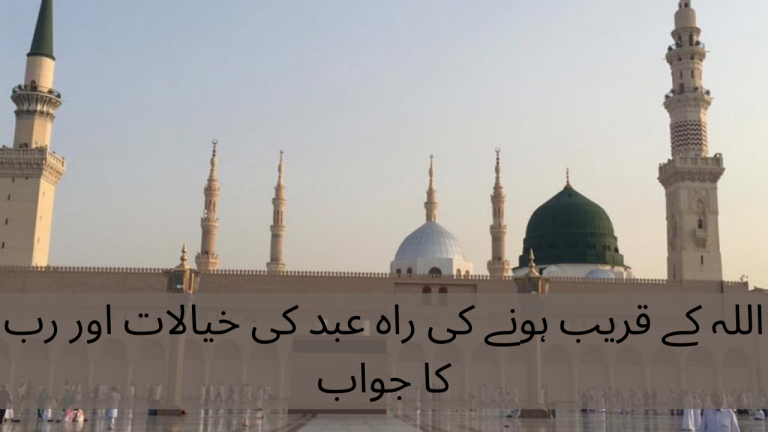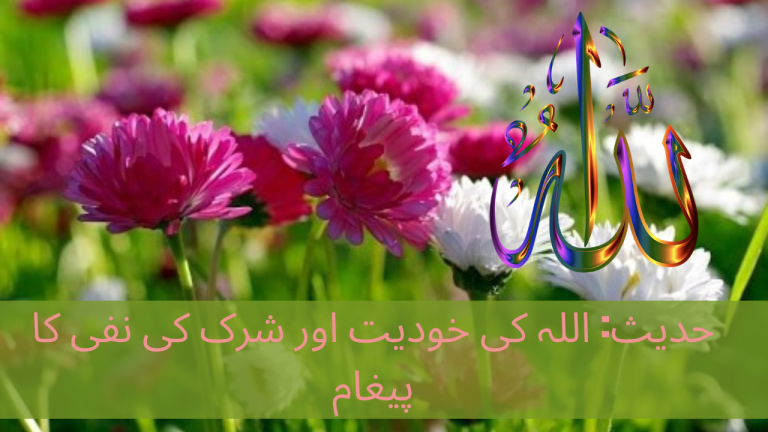Allah Ki Anaam Or Rahmat Ki Ahmiyat Ashrak Or Talsimat Ki Tarkwwb Ka Hadees

Allah Ki Anaam Or Rahmat Ki Ahmiyat Ashrak Or Talsimat Ki Tarkwwb Ka Hadees Belief in the oneness of Allah (Tawheed) is the fundamental cornerstone of Islamic faith. It encapsulates the core principle that there is no god but Allah, emphasizing His absolute oneness, uniqueness, and incomparability.
Allah Ki Anaam Or Rahmat Ki Ahmiyat Ashrak Or Talsimat Ki Tarkwwb Ka Hadees
A profound Hadith narrated by Zaid ibn Khalid al-Juhani (may Allah be pleased with him) serves as a powerful reminder of this central tenet.
In this Hadith, we find the Prophet Muhammad (peace be upon him) leading his companions in the Fajr prayer after a rainy night in Hudaybiyah. The sky was clear, and the blessings of rain were evident. After completing the prayer, the Prophet turned to the congregation and posed a thought-provoking question: “Do you know what your Lord has said?” Their response, “Allah and His Messenger know best,” reflected their humility and recognition of the Prophet’s knowledge.
The Prophet (peace be upon him) then conveyed a profound message. He explained that among the people gathered there were both believers and disbelievers. The distinction lay in their attribution of the rain’s cause. Those who acknowledged the rain as a result of Allah’s grace and mercy were believers in Allah but disbelievers in the idea that celestial objects like stars could influence events. In contrast, those who attributed the rain to specific stars were disbelievers in Allah’s sovereignty but believed in the power of those stars.
This Hadith underscores the importance of attributing all blessings and events to Allah alone. It rejects the notion of superstitions and celestial influence on worldly affairs, emphasizing that true faith lies in recognizing Allah as the ultimate source of everything. Belief in Allah’s mercy and grace should be unwavering, without compromise or association of partners with Him.
As Muslims, this Hadith reminds us of our responsibility to maintain a pure and unadulterated belief in Allah’s oneness. It teaches us to reject superstitions and false beliefs that deviate from the monotheistic principles of Islam. In doing so, we strengthen our faith, deepen our connection with Allah, and uphold the essence of Tawheed, the very foundation of our religion.
In a world often filled with misconceptions and distractions, this Hadith serves as a beacon of guidance, illuminating the path of true faith. It calls upon us to acknowledge Allah’s immense mercy and recognize His sole authority over the universe, urging us to reject any notions that compromise our belief in His absolute oneness. In this, we find clarity, steadfastness, and a deepening of our relationship with the one true God, Allah.
Hadees Of The Rasool
رواه البخاري (وكذلك مالك والنسائي)
Translation In Arabic
: عَنْ زَيْدِ بْنِ خَالِدٍ الْجُهَنِيِّ، رَضِيَ اللَّهُ عَنْهُ قَالَ: “صَلَّى لَنَا رَسُولُ اللَّهِ صَلَّى اللَّهُ عَلَيْهِ وَسَلَّمَ صَلَاةَ الصُّبْحِ بِالْحُدَيْبِيَةِ، عَلَى إِثْرِ سَمَاءٍ كَانَتْ مِنْ اللَّيْلَةِ، فَلَمَّا انْصَرَفَ النَّبِيُّ صَلَّى اللَّهُ عَلَيْهِ وَسَلَّمَ أَقْبَلَ عَلَى النَّاسِ، فَقَالَ لَهُمْ: “هَلْ تَدْرُونَ مَاذَا قَالَ رَبُّكُمْ؟ قَالُوا: اللَّهُ وَرَسُولُهُ أَعْلَمُ، قَالَ: أَصْبَحَ مِنْ عِبَادِي مُؤْمِنٌ بِي وَكَافِرٌ، فَأَمَّا مَنْ قَالَ: مُطِرْنَا بِفَضْلِ اللَّهِ وَرَحْمَتِهِ، فَذَلِكَ مُؤْمِنٌ بِي، كَافِرٌ بِالْكَوْكَبِ، وَأَمَّا مَنْ قَالَ: مُطِرْنَا بِنَوْءِ كَذَا وَكَذَا، فَذَلِكَ كَافِرٌ بِي، مُؤْمِنٌ بِالْكَوْكَبِ”
In Urdu
یہ حدیث زید بن خالد الجہنی (رضی اللہ عنہ) کی روایت ہے جس میں انہوں نے بیان کیا کہ حضرت رسول اللہ (صلی اللہ علیہ وآلہ وسلم) نے ہدیبیہ میں فجر کی نماز ادا کی، اور رات کی بارش کے بعد صاف آسمان کی حالت میں۔ نماز ادا کرنے کے بعد، حضرت رسول اللہ (صلی اللہ علیہ وآلہ وسلم) نے لوگوں کی طرف موڑ کر پوچھا کہ کیا تمہیں پتا ہے کہ تمہارے رب نے کیا فرمایا؟ لوگوں نے جواب دیا کہ اللہ اور اس کے رسول صلی اللہ علیہ وآلہ وسلم زیادہ جانتے ہیں۔
پس مندرجہ ذیل ترجمہ کی بنا پر حضرت رسول اللہ (صلی اللہ علیہ وآلہ وسلم) نے فرمایا: “صبح ہوئی اور میرے بندوں میں ایمان والا اور کافر ہوگیا ہے۔ جو شخص کہتا ہے کہ ہمیں اللہ کی نعمت اور رحمت کے ذریعے بارش ہوئی ہے، وہ میرے ایمان پر ہے اور ستاروں پر کافر ہے۔ اور جو شخص کہتا ہے کہ ہمیں اس اور اس ستارے کے نیچے ہوئی بارش کے ذریعے ہوئی ہے، وہ میرے ایمان پر ہے اور ستاروں پر کافر ہے۔”
In English
This Hadith is a narration from Zaid ibn Khalid al-Juhani (may Allah be pleased with him) in which he reported an incident that took place in Hudaybiyah. He said that the Prophet Muhammad (peace be upon him) performed the Fajr prayer in Hudaybiyah after a rainy night with a clear sky. After completing the prayer, the Prophet turned to the people and asked them if they knew what their Lord had said. They replied that Allah and His Messenger knew best.
The Prophet (peace be upon him) then said, “In the morning, there are among my slaves (people) believers and disbelievers. As for those who said, ‘We have had rain because of Allah’s grace and mercy,’ they are believers in Me and disbelievers in the star. But those who said, ‘We have had rain because of such-and-such a star,’ they are disbelievers in Me and believers in the star.”
This Hadith illustrates the Prophet’s role in teaching and clarifying matters of faith to his companions. It emphasizes the importance of attributing blessings and events to Allah’s grace and mercy, rather than associating them with superstitions or celestial objects. The Prophet (peace be upon him) used this occasion to instruct his followers on the correct belief regarding such matters.
Benefits Of The Hadees
The Hadith that emphasizes the importance of attributing blessings and events to Allah’s grace and mercy while rejecting superstitions has several notable benefits and lessons:
- Strengthening Belief in Tawheed (Oneness of Allah): This Hadith reinforces the core Islamic belief in the absolute oneness and uniqueness of Allah. It serves as a reminder that Allah alone is the ultimate cause of all events and blessings, strengthening the monotheistic faith of Muslims.
- Rejecting Superstitions: The Hadith unequivocally rejects the belief in superstitions and the attribution of worldly events to celestial objects or other false beliefs. It encourages Muslims to rely solely on Allah and to reject any practices or beliefs that deviate from Tawheed.
- Understanding the Role of Allah’s Mercy: By emphasizing Allah’s grace and mercy as the source of rain and blessings, this Hadith deepens Muslims’ understanding of Allah’s attributes. It highlights the concept that Allah’s mercy encompasses all aspects of life.
- Promoting Pure Worship: Belief in Allah’s grace and mercy encourages pure worship of Him alone. Muslims are reminded to turn to Allah in gratitude and devotion, seeking His guidance and blessings without any intermediaries or partners.
- Guidance Against Misconceptions: In a world where various superstitions and beliefs abound, this Hadith provides clear guidance to Muslims, protecting them from misconceptions and deviations that may compromise their faith.
- Affirming Allah’s Sovereignty: The Hadith affirms Allah’s absolute sovereignty over the universe and all that happens within it. It underscores that Allah is the ultimate controller of all affairs, dispelling any notions of independent celestial influences.
- Fostering Intellectual Discourse: This Hadith encourages intellectual discourse and critical thinking within the Muslim community. It prompts believers to reflect on the true causes of events and blessings and to engage in discussions about the importance of Tawheed.
- Spiritual Enlightenment: Muslims can use this Hadith for spiritual enlightenment and self-reflection, deepening their connection with Allah and their understanding of the essence of Tawheed.
- Maintaining Cultural Integrity: By rejecting superstitions and false beliefs, this Hadith helps Muslims maintain the cultural and religious integrity of their faith, preventing syncretism with non-Islamic practices.
- Enhancing Moral Values: Belief in Allah’s grace and mercy fosters a sense of gratitude and humility, encouraging Muslims to uphold moral values and act in ways that reflect their faith in Allah’s benevolence.
In summary, this Hadith serves as a profound reminder of the importance of maintaining a pure and unwavering belief in Allah’s oneness and rejecting superstitions or false beliefs. It reinforces the core principles of Islamic monotheism and guides Muslims on the path of true faith, devotion, and reliance on Allah’s grace and mercy.
Conclusion
The Hadith emphasizing belief in Allah’s grace and mercy while rejecting superstitions reinforces the foundational principle of Islamic monotheism (Tawheed). It underscores the absolute oneness and sovereignty of Allah and encourages pure worship free from associations or superstitions.
This Hadith offers guidance, protects against misconceptions, and fosters spiritual enlightenment. It serves as a steadfast reminder to maintain unwavering faith in Allah’s mercy as the ultimate source of blessings and events, anchoring Muslims in their devotion and belief in His oneness.





